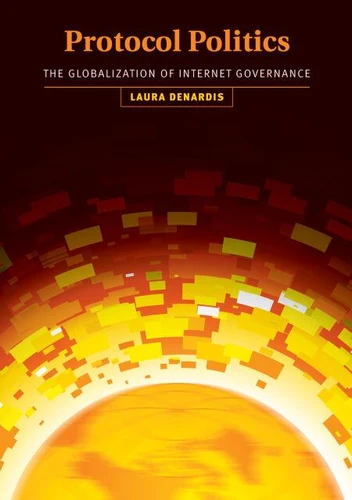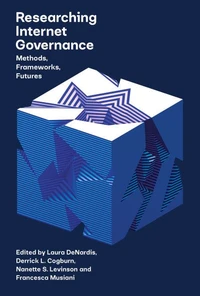Protocol Politics. The Globalization of Internet Governance
Par :Formats :
Disponible dans votre compte client Decitre ou Furet du Nord dès validation de votre commande. Le format ePub protégé est :
- Compatible avec une lecture sur My Vivlio (smartphone, tablette, ordinateur)
- Compatible avec une lecture sur liseuses Vivlio
- Pour les liseuses autres que Vivlio, vous devez utiliser le logiciel Adobe Digital Edition. Non compatible avec la lecture sur les liseuses Kindle, Remarkable et Sony
- Non compatible avec un achat hors France métropolitaine
 , qui est-ce ?
, qui est-ce ?Notre partenaire de plateforme de lecture numérique où vous retrouverez l'ensemble de vos ebooks gratuitement
Pour en savoir plus sur nos ebooks, consultez notre aide en ligne ici
- Nombre de pages288
- FormatePub
- ISBN978-0-262-25815-9
- EAN9780262258159
- Date de parution31/07/2009
- Protection num.Adobe DRM
- Taille2 Mo
- Infos supplémentairesepub
- ÉditeurThe MIT Press
Résumé
What are the global implications of the looming shortage of Internet addresses and the slow deployment of the new IPv6 protocol designed to solve this problem?The Internet has reached a critical point. The world is running out of Internet addresses. There is a finite supply of approximately 4.3 billion Internet Protocol (IP) addresses-the unique binary numbers required for every exchange of information over the Internet-within the Internet's prevailing technical architecture (IPv4).
In the 1990s the Internet standards community selected a new protocol (IPv6) that would expand the number of Internet addresses exponentially-to 340 undecillion addresses. Despite a decade of predictions about imminent global conversion, IPv6 adoption has barely begun. Protocol Politics examines what's at stake politically, economically, and technically in the selection and adoption of a new Internet protocol.
Laura DeNardis's key insight is that protocols are political. IPv6 intersects with provocative topics including Internet civil liberties, US military objectives, globalization, institutional power struggles, and the promise of global democratic freedoms. DeNardis offers recommendations for Internet standards governance, based not only on technical concerns but on principles of openness and transparency, and examines the global implications of looming Internet address scarcity versus the slow deployment of the new protocol designed to solve this problem.
In the 1990s the Internet standards community selected a new protocol (IPv6) that would expand the number of Internet addresses exponentially-to 340 undecillion addresses. Despite a decade of predictions about imminent global conversion, IPv6 adoption has barely begun. Protocol Politics examines what's at stake politically, economically, and technically in the selection and adoption of a new Internet protocol.
Laura DeNardis's key insight is that protocols are political. IPv6 intersects with provocative topics including Internet civil liberties, US military objectives, globalization, institutional power struggles, and the promise of global democratic freedoms. DeNardis offers recommendations for Internet standards governance, based not only on technical concerns but on principles of openness and transparency, and examines the global implications of looming Internet address scarcity versus the slow deployment of the new protocol designed to solve this problem.
What are the global implications of the looming shortage of Internet addresses and the slow deployment of the new IPv6 protocol designed to solve this problem?The Internet has reached a critical point. The world is running out of Internet addresses. There is a finite supply of approximately 4.3 billion Internet Protocol (IP) addresses-the unique binary numbers required for every exchange of information over the Internet-within the Internet's prevailing technical architecture (IPv4).
In the 1990s the Internet standards community selected a new protocol (IPv6) that would expand the number of Internet addresses exponentially-to 340 undecillion addresses. Despite a decade of predictions about imminent global conversion, IPv6 adoption has barely begun. Protocol Politics examines what's at stake politically, economically, and technically in the selection and adoption of a new Internet protocol.
Laura DeNardis's key insight is that protocols are political. IPv6 intersects with provocative topics including Internet civil liberties, US military objectives, globalization, institutional power struggles, and the promise of global democratic freedoms. DeNardis offers recommendations for Internet standards governance, based not only on technical concerns but on principles of openness and transparency, and examines the global implications of looming Internet address scarcity versus the slow deployment of the new protocol designed to solve this problem.
In the 1990s the Internet standards community selected a new protocol (IPv6) that would expand the number of Internet addresses exponentially-to 340 undecillion addresses. Despite a decade of predictions about imminent global conversion, IPv6 adoption has barely begun. Protocol Politics examines what's at stake politically, economically, and technically in the selection and adoption of a new Internet protocol.
Laura DeNardis's key insight is that protocols are political. IPv6 intersects with provocative topics including Internet civil liberties, US military objectives, globalization, institutional power struggles, and the promise of global democratic freedoms. DeNardis offers recommendations for Internet standards governance, based not only on technical concerns but on principles of openness and transparency, and examines the global implications of looming Internet address scarcity versus the slow deployment of the new protocol designed to solve this problem.




